Linsley Surname Ancestry ResultsOur indexes 1000-1999 include entries for the spelling 'linsley'. In the period you have requested, we have the following 81 records (displaying 21 to 30): Single Surname Subscription | | | Buying all 81 results of this search individually would cost £444.00. But you can have free access to all 81 records for a year, to view, to save and print, for £100. Save £344.00. More... |
These sample scans are from the original record. You will get scans of the full pages or articles where the surname you searched for has been found. Your web browser may prevent the sample windows from opening; in this case please change your browser settings to allow pop-up windows from this site. Traders and professionals in London
(1805)
Holden's Triennial Directory for 1805 to 1807 includes this 'London Alphabet of Businesses, Professions, &c.': coverage is good; about 30,000 individuals are recorded.LINSLEY. Cost: £4.00.  | Sample scan, click to enlarge
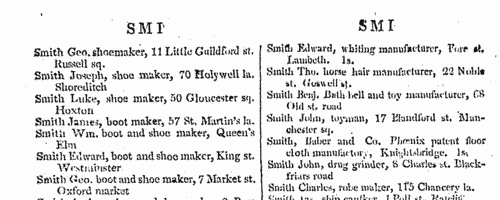
| Yorkshire West Riding Freeholders
(1817)
A ballot was held at Wakefield 12 to 16 May 1817 for the choice of a new Register (registrar) for the West Riding Registry of Deeds, following the death of J. A. Busfeild esq. The candidates were Francis Hawksworth, esq. (1) and William Lister Fenton Scott esq. (2). 2544 freeholders voted, qualification being male adults in possession of at least £100 per annum. This alphabetical poll book was compiled from the scrutators' and poll clerks' books: it gives full name (surname first) and residence, as well as the situation of the qualifying freehold. Each man's name is preceded by a 1 or 2, indicating for whom his vote was cast.LINSLEY. Cost: £6.00.  | Sample scan, click to enlarge

| Deaths, Marriages, Bankrupts, Dividends and Patents
(1819-1820)
Death notices and obituaries, marriage and birth notices, bankrupts and dividends, and patents, as reported in the Monthly Magazine or British Register. Includes some marriages and deaths from Ireland, Scotland and abroad.
LINSLEY. Cost: £6.00.  | Sample scan, click to enlarge

| Freeholders voting in Castle ward, Northumberland
(1826)
An election to choose two knights of the shire to represent Northumberland took place at Alnwick from 20 June to 6 July 1826. The candidates were Henry Thomas Liddell (L), Matthew Bell (B), Thomas Wentworth Beaumont (Bt) and Viscount Howick (H). The franchise included all freeholders of property worth 40 shillings or more per annum: each had two votes, but could plump for a single candidate. This poll book was published in 1827 and lists the voters from each ward: the freeholder's full name (surname first), residence, and the nature of the freehold (such as 'house at Corbridge'). The votes are shown in the right hand columns, with plumpers shown by a dagger. Castle ward included North Shields and the surrounding countryside.LINSLEY. Cost: £6.00.  | Sample scan, click to enlarge

| Boys entering Leeds Grammar School
(1827)
The admission books for Leeds Grammar School from 1820 to 1900 were edited by Edmund Wilson and published in 1906. The series of registers is almost complete for the period, there being in addition admission registers for the Lower (or Commercial) Department from 1856 to 1865, and lists of boys in the school in 1856, and in the Commercial Department in 1861. The entries are arranged by date or term of admission: a sequential number is given first, then surname, christian name, and, after a dash, father's christian name, occupation, and address; another dash, and then the age of the boy at admission, and often his year of leaving (with the abbreviation r. for 'removed' or 'left'). r.* means left without notice; (o) or S. or Stranger or Foreigner indicates a boy not on the foundation. The editor was unable to divine the meaning of the abbreviation (Q) or the asterisks prefixed to most entries in 1856 to 1860, but dutifully copies them into the text. In smaller type he then proceeds, where possible, to add some information about the boy's subsequent career.LINSLEY. Cost: £4.00.  | Sample scan, click to enlarge
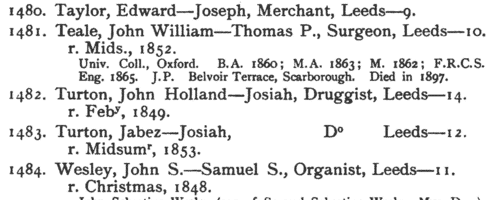
| Insolvents
(1827)
Insolvency notices for England and Wales: insolvency often caused people to restart their lives elsewhere, so these are an important source for lost linksLINSLEY. Cost: £6.00.  | Sample scan, click to enlarge

| South County Durham Poll Book: Bishop Auckland District
(1832)
A poll for two Knights of the Shire to represent in Parliament the Southern Division of the county palatine of Durham was taken on 21 and 22 December 1832. This poll book sets out all the electors by polling district (Barnard Castle, Bishop Auckland, Darlington, Middleton-in-Teesdale, Sedgefield, Stanhope and Stockton) and gives registered number; full name (surname first); place of abode; nature of qualification (such as House as occupier, Land as occupier, Copyhold Property, &c.); and the name of the parish, township or place where the property is situate. The votes are set out in the right-hand columns, under P. (for Joseph Pearse, jun., esq.), B. (John Bowes, esq.), and S. (Robert Duncombe Shafto, esq.), the three candidates. A voter could choose two candidates, in which case a dash is put in each of the two appropriate columns, or plump for just one - where a star is placed in that candidate's column. This was the first election after the Reform Act, which extended the franchise in the counties to all adult men possessing freehold worth 40s a year or more, or copyhold or long leasehold of £10 or more, or being tenants or short leaseholders of £50 or more. LINSLEY. Cost: £4.00.  | Sample scan, click to enlarge

| Electors in Hull
(1835)
A poll was taken 6 and 7 January 1835 for the election of members to serve in Parliament for the borough of Kingston-upon-Hull, the candidates being Matthew Davenport Hill, William Hutt and David Carruthers. This poll book lists all the electors in the wards of Hull (St Mary's, North, Trinity, Whitefriar, Humber, Austin, and South Myton), in Sculcoates, and in Sutton, Southcoates, Drypool &c. In each ward the names are arranged in five sections: Householders and Burgesses occupying Ten Pound Households; Burgesses not occupying Ten Pound Households; Unpolled Voters residing in the ward; Unpolled Freemen; and Non-Resident Freemen not polling. There are also short lists of votes that were tendered but the validity of which remained uncertain. In all cases full names and addresses are given: where electors voted, their votes are indicated in the right-hand columns, the numbers shown there being their numbers in the cumulating totals for each candidate. After the name of each voter there is an italic a or b showing whether he voted on the first or second day. LINSLEY. Cost: £4.00.  | Sample scan, click to enlarge
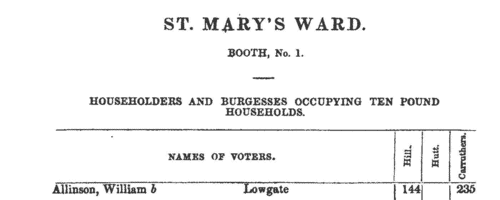
|  British merchant seamen
(1835-1836) British merchant seamen
(1835-1836)
At this period, the foreign trade of ships plying to and from the British isles involved about 150,000 men on 15,000 ships; and the coasting trade about a quarter as many more. A large proportion of the seamen on these ships were British subjects, and so liable to be pressed for service in the Royal Navy; but there was no general register by which to identify them, so in 1835 parliament passed a Merchant Seamen's Registration Bill. Under this act this large register of British seamen was compiled, based on ships' crew lists gathered in British and Irish ports, and passed up to the registry in London. Each seaman was assigned a number, and the names were arranged in the register by first two letters of the surname (our sample scan shows one of the pages for 'Sm'); in addition, an attempt was made to separate out namesakes by giving the first instance of a name (a), the second (b), and so on. But no effective method was devised to prevent the same man being registered twice as he appeared in a second crew list; moreover, the original crew lists were clearly difficult for the registry clerks to copy, and some of the surname spellings appear to be corrupted. A parliamentary committee decided that the system devised did not answer the original problem, and this register was abandoned after less than two years: but it is an apparently comprehensive source for British merchant seamen in 1835 to 1836. The register records the number assigned to each man; his name; age; birthplace; quality (master, captain, mate, 2nd mate, mariner, seaman, fisherman, cook, carpenter, boy &c.); and the name and home port of his ship, with the date of the crew list (usually at the end of a voyage). Most of the men recorded were born in the British Isles, but not all (for instance, Charleston and Stockholm appear in the sample scan). The final column 'How disposed of' is rarely used, and indicates those instances where a man died, was discharged, or deserted his ship during the voyage.LINSLEY. Cost: £8.00.  | Sample scan, click to enlarge
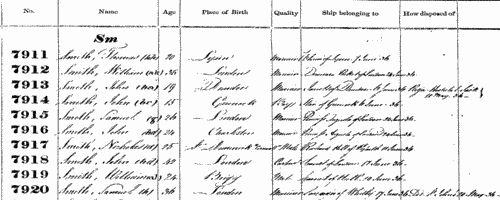
| Shareholders in the Leeds Commercial Banking Company
(1838)
The provincial banks of England and Wales made annual returns to the Stamp Office of their proprietors or shareholders. These returns, registered in March 1838, from the 103 banks then in existence, contain the full names and addresses of nearly 30,000 shareholders.LINSLEY. Cost: £6.00.  | Sample scan, click to enlarge
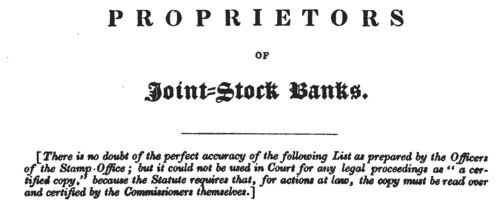
|
Research your ancestry, family history, genealogy and one-name study by direct access to original records and archives indexed by surname.
|













